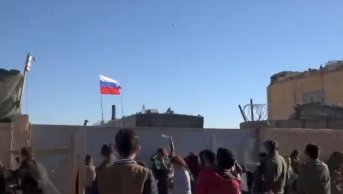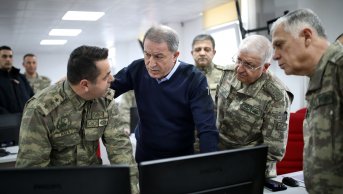Threats and Opportunities Awaiting Turkey in Syria

The power distribution among internal actors no longer steers the military developments in Syria. Neither the Regime, the opponents, the SDF/YPG nor ISIS have a strong chance of establishing authority over one another without foreign support. The negotiations and agreements among foreign powers determine the forces to proceed and and where they will proceed to.
Over the past few months the Regime forces seem to have made serious advances. The Regime's advances have been detrimental to ISIS and this military achievement cannot only be explained by the support from Russia and Iran. A safe zone agreement was signed in Astana, peace talks initiated by Turkey, Russia and Iran, and a ceasefire was declared in four territories controlled by the rebels. The agreement brings partial relief to the conflict between the Regime and the rebels, which is the main contradiction of the Syrian Civil War. As the conflict between these two groups decrease, the Regime forces could turn their interest towards other conflict zones. The government forces, regarding western Syria as safe for now, rapidly advancing towards eastern territories of ISIS. The Regime is fighting on two fronts; one is ISIS, the other one is the YPG/PKK who are gradually growing with the support from USA. Lastly, the Regime forces took control of the Raqqa-Deir ez-Zor road and limited the possibility of the YPG/PKK advancing to Deir ez-Zor after they seized Raqqa. In addition, the Regime is capturing neighborhoods around Raqqa and surrounding the city from south. Hence, the Regime's progress causes as much distress for USA and YPG/PKK as it does for ISIS. That is why recently the PYD has been claiming "Iran's projects for Syria are more dangerous than ISIS".
Although Russia/Iran/the Regime alliance enhanced their position in Deir ez-Zor, in central Raqqa USA/SDF/YPG is still calling the shots. Prior to the launch of central Raqqa operation, ISIS militants were claimed to have evacuated most of the city and withdrew to Deir ez-Zor therefore, the SDF/YPG could easily take the city. However, as the operation continues this claim turns out to be false. The operation has begun in July and only 40% of the city could be reclaimed from ISIS in one and a half months with heavy losses on SDF/YPG's part. According to U.S. authorities there are still close to 2,000 ISIS fighters in the city. These fighters have no way to escape the city so in a sense, they will continue fighting as suicide bombers. In the following days the SDF/YPG will continue fighting with heavy losses however, there is no doubt that they will take control of the city eventually.
The YPG intends to include Raqqa to their unilaterally declared "federation", as well. Manbij and Tell Abyad are two striking examples to forecast what the future holds for Raqqa after ISIS is wiped out. The YPG/PKK promised to let the local people rule themselves after these two cities are liberated from ISIS. They established local parliaments and made it seem like there was a legitimate administration on the job. However, the heads of these local governments neither have an influence on the society nor are the real power of the cities. Local people were gathered to form Military Councils for security but in the power hierarchy of these councils nobody can say a word over the PKK. Manbij and Tell Abyad's people witnessed forced migrations, confiscations, and relocating civilians from other regions to alter the demography of the cities. The YPG/SDF had already established a Local Parliament for Raqqa even before they claimed the city. They have also worked on increasing the number of Arabs in the SDF. But it would not be reasonable to anticipate an outcome for Raqqa different than what happened in Manbij and Tell Abyad.
The YPG's main struggle about Raqqa may begin after the city is claimed from ISIS. After the latest operations the Regime's and Iran's forces are almost 10 kilometers away from the central Raqqa and their attitude towards the YPG's "federation" plan could be more unfavorable than Turkey. The Regime and Iran temporarily halted any threat from rebels with the safe zone deal therefore they are free to head towards the YPG after they handle ISIS.
Russia, on the other hand, has different opinions when it comes to a federation and the YPG's role in Syria. In the draft constitution Russia prepared for Syria, there is "autonomy for Kurds". Russia occasionally supported the YPG and acted as a shield between Turkey. Despite all this, Russia's priority in Syria is certainly not the YPG. Russia's real allies in Syria are the Regime and Iran. About establishing a federation, Russia needs to convince its own allies first. However, it is not very likely for both of these actors to support a federation considering their need for a strategic cooperation with the YPG decreases as they get stronger. Still, this does not indicate a conflict between the Regim and the YPG any time soon. As long as their mutual enemy, the rebels, exist they may continue to depend on each other. During the first few years of the civil war, the PYD/YPG took advantage of Turkey's pressure on Syrian regime. The Regime allowed the PYD to move north instead of Turkey and Turkey-backed rebels. Now the Regime may take advantage of Turkey's pressure on the YPG and may plan to return to the YPG territories, primarily Raqqa, Afrin, and Manbij. The YPG is determined to not let go of any of its territories as long as USA's protection continues. But the organization has a B plan in case the U.S. protection ends or weakens. The YPG does not lose contact with the Regime and may prefer to let the Regime have the aforementioned territories.
Recently, another important conflict zone in Syria is Idlib. After the Regime forces seized Aleppo, their next target was expected to be Idlib. Idlib has several aspects that makes it important. First of all, it is the only province and the city center controlled fully by the rebels. Secondly, armed groups and individuals in all Syria, including Aleppo, have all moved to Idlib as a result of ceasefire agreements. Therefore, Idlib gathers more than 2,5 million civilians and more armed fighters than all other regions. Thirdly, Idlib is the headquarters of Al-Qaeda and its affiliated organizations which are expected to be the targets after ISIS. Al-Nusra Front, Al-Qaeda's Syria branch, have previously declared itself free from Al-Qaeda and got renamed as Jabhat Fateh al-Sham (Front for the Conquest of the Levant). However, this organization is still widely accepted as a branch of Al-Qaeda.
Following the Astana talks, tensions began to rise among some rebels in Idlib. A conflict broke out between the FSA groups which accept the ceasefire decision of Astana talks and Al-Nusra Front which perceives the talks as "a betrayal to the revolution". One of Astana's main objectives was to separate the radicals from the moderates and then, eliminate the radicals. Astana talks automatically made two sides clear in Idlib. The radical groups united under Hay'at Tahrir al-Sham (HTS) led by Al-Nusra Front. The FSA groups gathered under the leadership of Ahrar al-Sham and Faylaq al-Sham and began to provide protection from HTS. Ahrar al-Sham, the strongest group in Idlib after Al-Nusra Front, had been trying to remain neutral during the divergence in Idlib even though they once participated in Astana talks. After Turkey stated that it might send Turkish soldiers to Idlib, HTS believed itself to be the target of that statement so the group attacked and captured many strategic territories in Idlib, most of which controlled by Ahrar al-Sham. As a result of many battles in July HTS seized Bab al-Hawa Border Crossing, neighborhoods around the border crossing and Turkey-Idlib border, and Idlib city center.
Following Al-Nusra Front's this move, Idlib now seems like a new "Islamic Emirate" under Al-Qaeda control. Even though this picture is far from the truth, all sides of the conflict could benefit from this except for Turkey. Russia/Iran/the Regime will most likely focus on Idlib once they have control over eastern Syria. Idlib controlled by Al-Nusra Front would provide a basis for the "fight against terrorism" claim and increase international support for an operation to Idlib. Many countries, primarily the U.S, would have a chance to interfere a territory that Turkey is closely interested. Recently, the U.S. Special Envoy for the Global Coalition to Counter ISIS Brett McGurk stated his concerns about Al-Qaeda in Idlib and criticized Turkey, as well. McGurk, one of the architects of the alliance between the U.S. and the YPG, said "In Idlib we should consider shutting down the border and making sure no one crosses it just like we did in some other territories of ISIS. This statement has two meanings. Firstly, once fight against ISIS is over in Syria the U.S. will divert its attention to HTS and directly interfere them. The second one is more dangerous for Turkey as the U.S. indicates conducting military operations in Turkey's borderlands in alliance with the YPG on the grounds of fighting against ISIS. As we remember the U.S. ended his support program to the rebels, with whom Americans are planning to shut down the border is a question that comes to mind.
All the actors have used ISIS and the fight against terrorism statements as an excuse to implement their own plans in Syria. The U.S. and the YPG have formed areas under their influence via fight against ISIS and have attempted to drive Turkey out of northern Syria. Operation Euphrates Shield was a strategic move and also an act of defiance to the U.S. and the YPG. Now there are attempts to build a new order in Idlib through Al-Qaeda. It is evident that a foreign operation to Idlib would generate vital threats for Turkey. As soon as HTS seizes Idlib, the distinction between the moderates and the rebels won't matter and a risk of mass destruction will present itself. 2,5 million civilians of Idlib will naturally immigrate to Turkey. Radical fighters who had to leave Idlib may also arrive among these civilians. Most importantly, foreign forces could locate themselves on Turkey-Idlib border. For a long time Turkey has been in favor of enabling the moderates to gain power in Idlib. Yet, HTS's dominant power over the moderates has prevented this policy from achieving any results. Turkey should somehow end the discourse claiming Idlib is "an Al-Qaeda Emirate". Otherwise, it may have to combat an anti-Turkey order imposed in the name of fight against Al-Qaeda and most importantly may lose Idlib, a critical leverage against the YPG.
The article was published in Star Newspaper with title of “Suriye’de Türkiye’yi Bekleyen Tehditler ve Fırsatlar” on 12 August, 2017.










